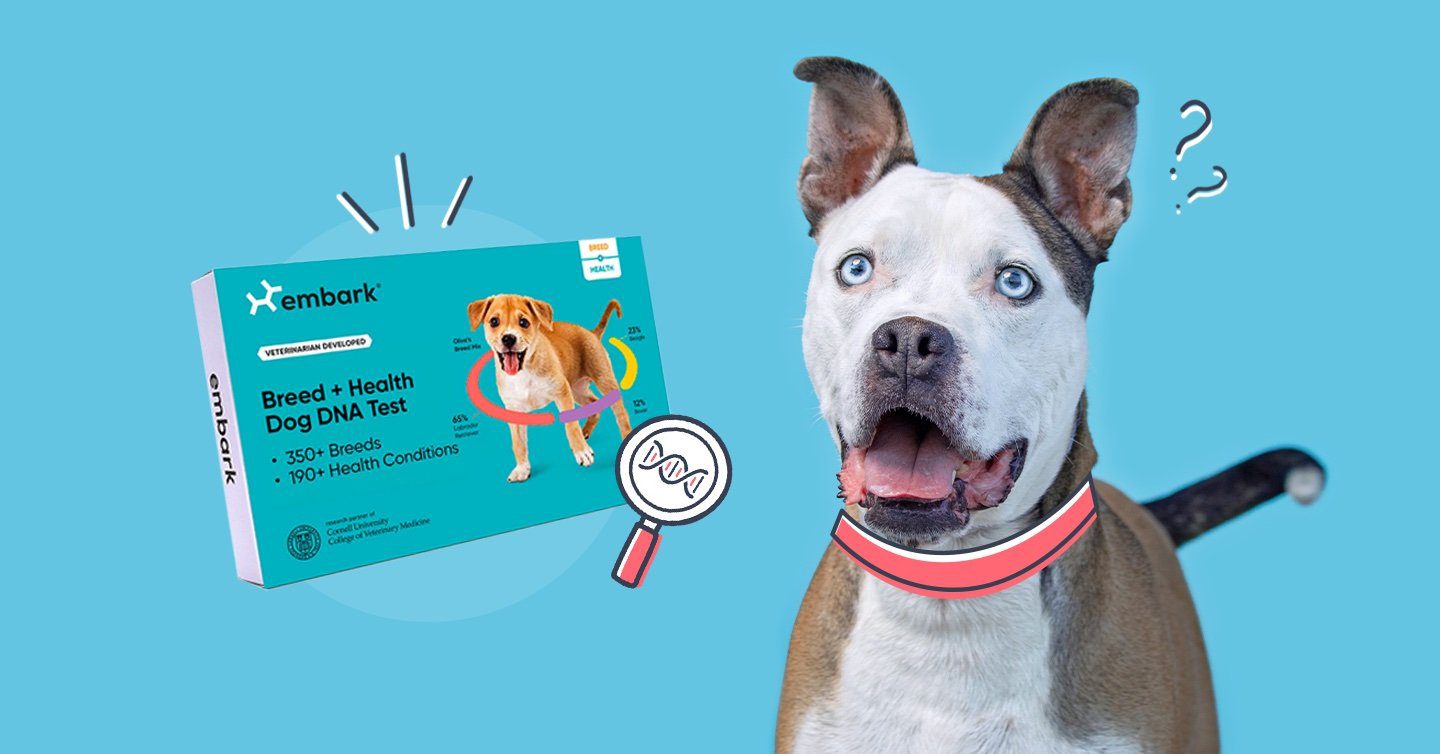When I chose to use a dog DNA testing kit, it was partly about curiosity, partly about science, and 100% about being obsessed with my dogs.
Like millions of Americans, I have mixed breed dogs for pets. On walks or trips to the pet store, I’m often asked, “What breed is that?” People are curious about Vera’s scruffy mane and Scout’s cookies-and-cream coat and curly tail. Before I tried a dog DNA test, I had no idea how to answer. I liked to joke that Vera was half-dinosaur and Scout was a husky who’d been hit by a shrink ray.
Thanks to modern science and a cotton swab, it didn’t have to remain that way.
Read on to learn how dog DNA test kits work, how much they cost, and our picks for the best dog DNA kit on the market.
Disclaimer: When you buy through links on our site, we may earn an affiliate commission.
The 4 best dog DNA test kits: Ranked
Despite the rising popularity of dog DNA testing, only a few companies offer quality services. The most commonly known are Embark and Wisdom Panel, both of which promise not only to reveal your dog’s breed mix but also their family tree all the way back to their great grandparents. Other well-known companies include DNA My Dog and Orivet.
But what separates a great dog DNA test from a good one? Two things matter most: the number of breeds in the company’s database and the precision of their results. Here’s a breakdown of our top four picks and why we chose them.
#1 Ranked: Embark DNA Test
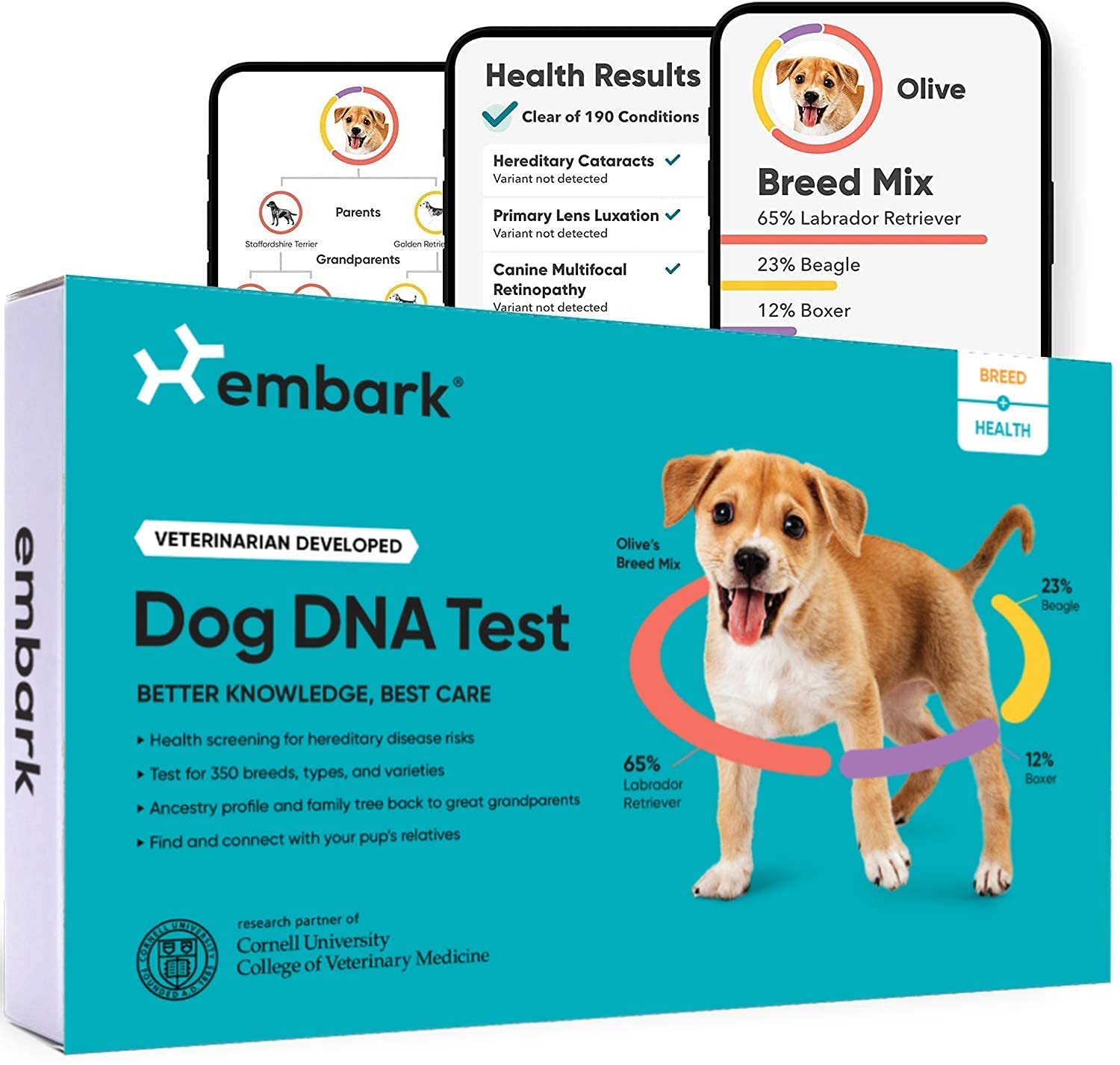
Embark’s dog DNA tests are the most accurate, information-rich tests on the market. For mixed breed dogs, Embark’s Breed ID or Breed + Health Kit is best. Embark tests for over 210 genetic health risks and 350 breeds, including the likes of dingoes, village dogs, and even wolves!
Embark Dog‘s founders, Ryan and Adam Boyko, have dedicated their lives to researching the genetic history of dogs. Passionate about enhancing dogs’ health care through advanced scientific discovery, their pioneering research has uncovered the basis for many canine genetic diseases and traits. The Embark test is produced in partnership with the Cornell University College of Veterinary Medicine and garners thousands of stellar online reviews.
Why we love it: Embark delivers the most accurate, extensive dog DNA results on the market. From start to finish, Embark provides an amazing experience for dog owners with clear instructions, professional packaging (postage included), and a personalized profile to view your dog’s results. Embark captures 200,000 genetic markers, giving you a wealth of information about your dog’s breed ID, ancestry, and predisposition to genetic health conditions. Plus, they offer the world’s only canine relative finder, so you can connect with dogs that share your precious pooch’s DNA. If you’re looking for the real deal, look no further than Embark.
Use code PUMPKIN at checkout!
#2 Ranked: Wisdom Panel
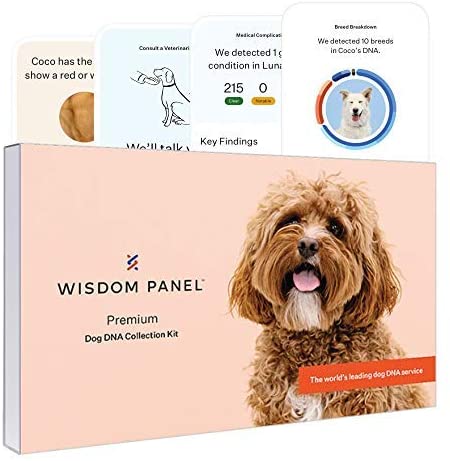
Coming in at #2 is Wisdom Panel, another high-quality dog DNA test kit. Wisdom Panel was born out of Mars Petcare and offers two dog DNA kits: Wisdom Panel Essential and Wisdom Panel Premium. Wisdom Panel Essential is a basic breakdown of breed composition and 25 “must-know” potential gene mutations such as MDR1 (multi-drug resistance) and Wisdom Panel Premium is a more extensive breakdown of breed composition and health insights.
Why we like it: Similar to Embark, Wisdom Panel tests for over 210 genetic health risks and 350 breeds making it a fairly extensive database. Wisdom Panel’s internal testing has revealed that its breed results are 93% accurate for mixed breeds, yielding reliable results. Your pup’s results are delivered via email where you can view your results on an easy-to-understand web page. Though medical testing is included in Wisdom Panel Premium, Embark’s medical testing remains unmatched, which is why Wisdom Panel wins second place.
#3 Ranked: DNAmyDog
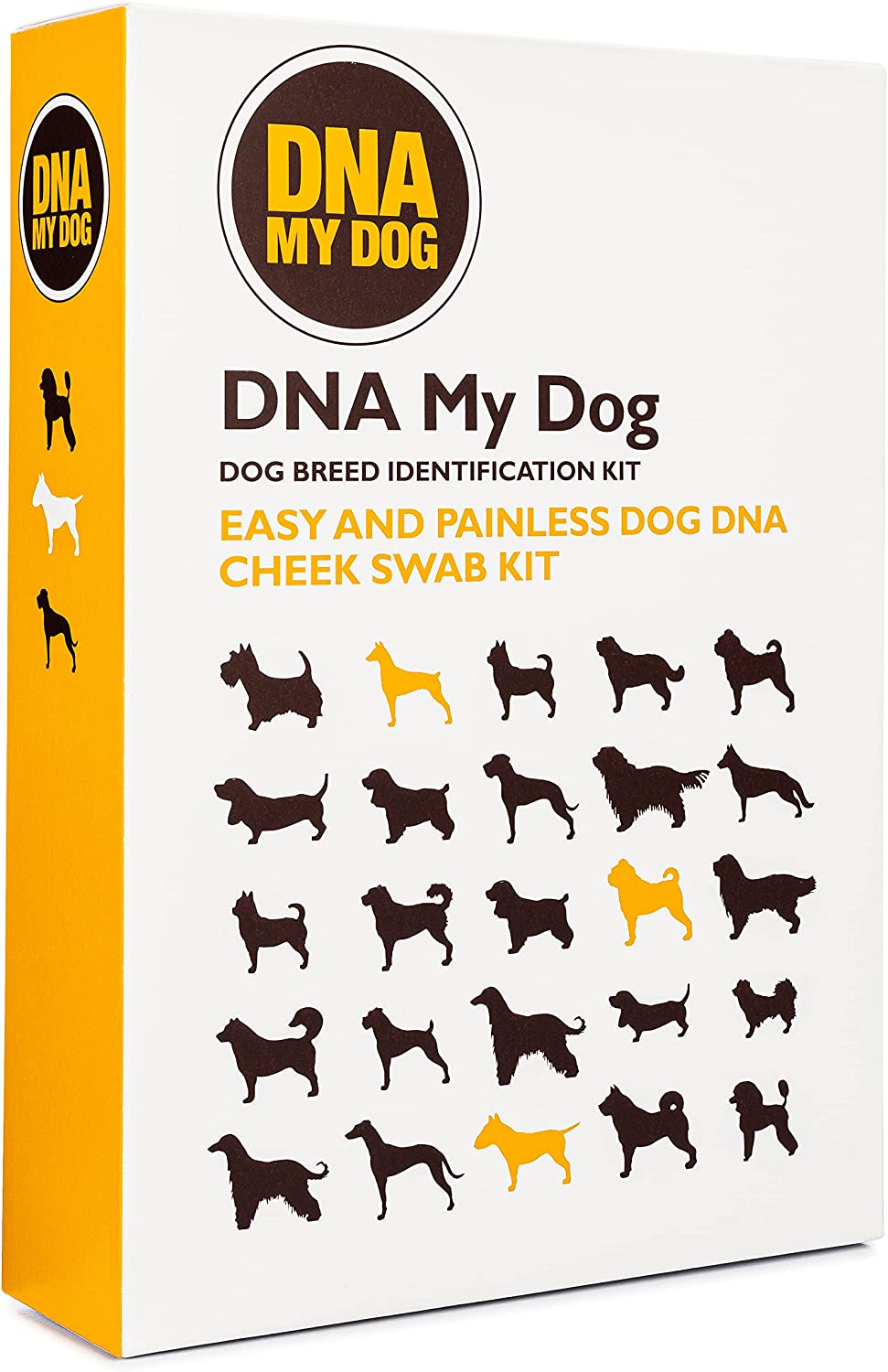
If you’re looking for a dog DNA test in a lower price range, DNAmyDog might be a good option for you. Less expensive than both Embark and Wisdom Panel, DNAmyDog gives you insight into your pup’s breed breakdown, breed history, personality traits, exercise levels, and some high-level health insights. DNAmyDog comes in at #3 because it has a smaller database of breeds on hand. This means that if your dog is of a rare origin or an unregistered breed, DnaMyDog is probably not the best choice.
Why we like it: DNAmyDog is a great budget-friendly option. When you receive your results, you’ll get a custom photo certificate of the breed composition of your dog, a report on your dogs dominant breeds, personality traits and health concerns, and a percentage breakdown of each level of each breed. Although it does have a much smaller breed database than its competitors, their database represents the majority of common dog breeds in the United States. If budget is a concern, check out DNAmyDog.
Pet Pro Tip: When shopping for products for your dog, make sure to also help protect your pooch with best-in-class dog insurance or puppy insurance plans for accidents & illnesses.
#4 Ranked: Orivet
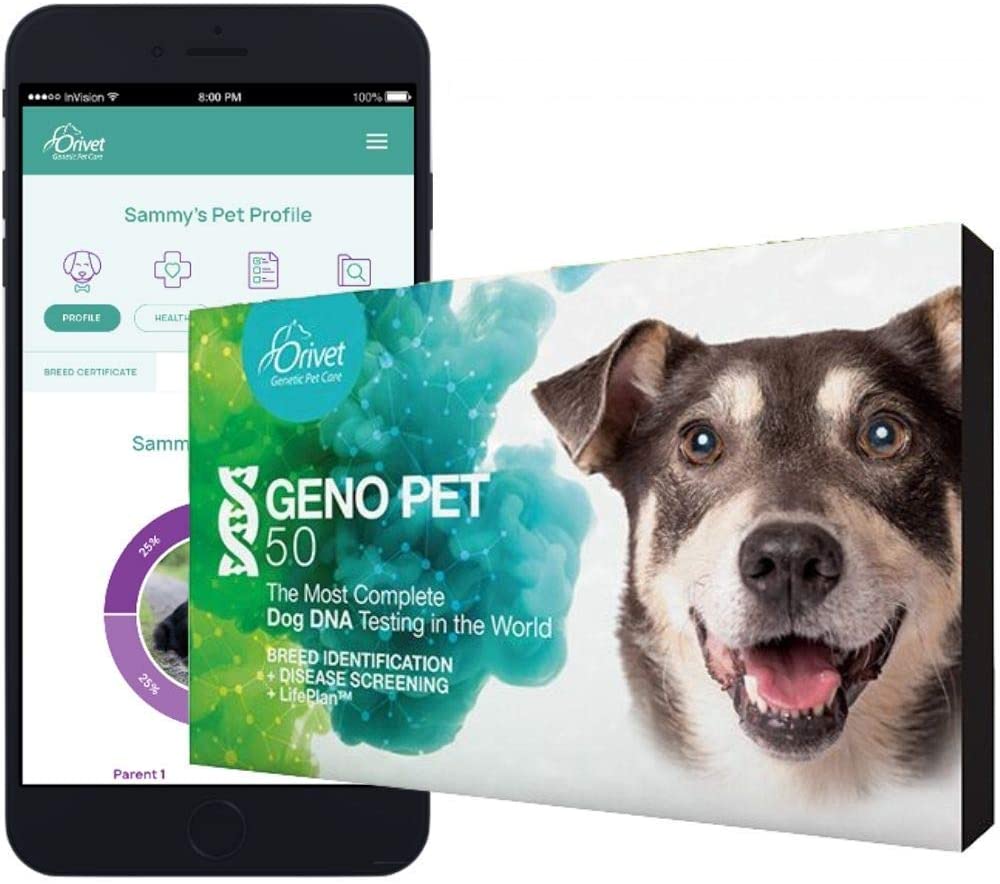
Coming in fourth on our Dog DNA kit list is Orivet. Although Orivet markets itself primarily to breeders and veterinarians, its extremely detailed health tests cater to pet parents who love to dig into the nitty gritty. Orivet screens for over 350 breeds and canine varieties and over 250 diseases and traits. The GenoPet 5.0 is Orivet’s latest dog DNA test, and is priced at $99 on Amazon.
Why we like it: Orivet is a quality test for a reasonable price. Orivet’s results come with a percentage of each breed in your dog’s DNA, health findings, and also a personalized wellness plan based on the dog breeds discovered as well as your dog’s age, weight, gender, geographic location, and lifestyle. Some reviewers have reported extra long wait times for results, so if you’re eager to find out, this might not be the test for you.
How does a dog DNA test work?
Luckily for us dog owners, the dog DNA test process is fairly easy. Simply order a dog DNA kit from a site like Amazon, Chewy, (or from our top picks below!) and receive your breed identification test in the mail.
To get a sample of your dog’s DNA, the kit will provide a cheek swab to swipe the inside of your dog’s cheek. We recommend using a treat to get your dog’s attention and cooperation, but don’t let them eat it until you’ve swabbed them, as the treat can dilute their saliva and mess up your results.
Your kit should come with instructions on how to properly package and send your dog’s sample back in the mail. Once the lab receives your dog’s DNA sample, it will be analyzed and compared against an extensive breed database.
Within a few weeks, you should receive your dog’s results via email. Some kits like Embark and Wisdom Panel offer customized online portals for viewing your dog’s genetic makeup and break down their breed heritage by percentage.
Are dog DNA tests regulated?
The short answer is no. The U.S. Food and Drug Administration (FDA) doesn’t monitor the quality or promises of dog DNA tests, unlike its regulation of human DNA tests such as Ancestry and 23andMe. The companies themselves promise high levels of internal quality control.
How much is a dog DNA test?
The short answer is it depends. Dog DNA tests typically range anywhere from $60 to $200 depending on how deep you want to dive into your dog’s genetics. Where some tests only include your dog’s breed ID, others might include more in-depth information such as health risks, a family tree, and more.
Three things to keep in mind when you get your results
1. Your dog’s test results aren’t their destiny
Dog DNA testing can help satisfy our curiosities. Is there a purebred in my mutt’s past? Does my furry giant possess terrier genes? Is my petite pup hiding German Shepherd genetic markers?
While the possibilities are exciting, it’s important to remember that your dog’s breed isn’t their destiny. Whatever your dog’s makeup, be sure to remember that breed isn’t everything after you get those breed results. Dog breeds that have been stigmatized in the past, such as the Pitbull Terriers and American Staffordshire Terriers, might alarm pet parents if they show up in a pet’s breed breakdown. However, plenty of evidence shows that these breeds make great pets with proper socialization, just as much as a Lab or a Chihuahua.
In sum, knowing your dog’s breed can help you learn more about your beloved canine, but it won’t always explain everything – like why they stare at you all the time (seriously, why?)
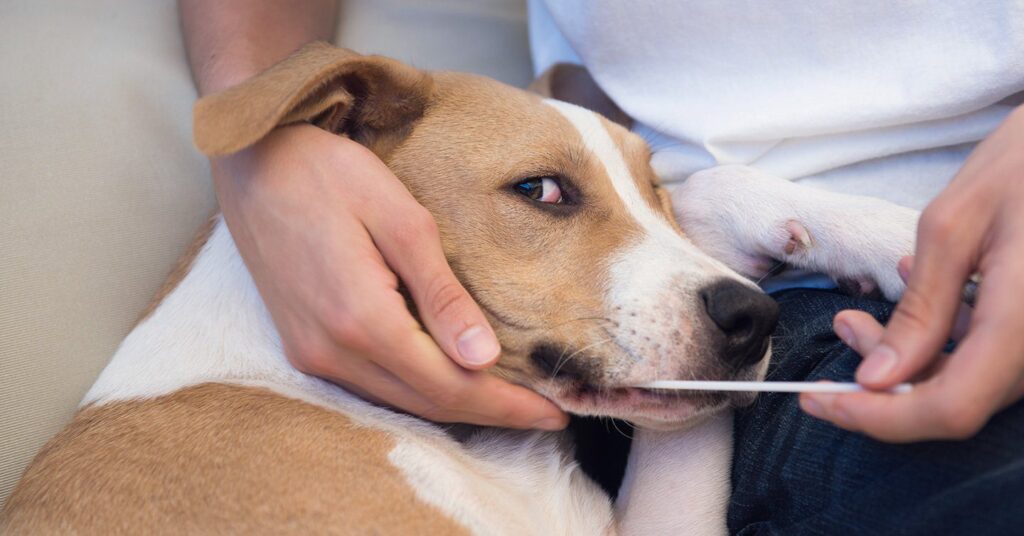
2. Dog DNA tests can give clues to your dog’s ideal lifestyle
Knowing your dog’s breed doesn’t just satisfy a pet parent’s curiosity, but it also provides useful information. As VCA Hospitals note, knowing the breed mix “can help an owner develop a more accurate diet, wellness, and preventative care plan for their pet.”
Different breeds lend themselves to different lifestyles. For instance, a Labrador Retriever, bred to help fishermen, lives to visit the local swimming hole. Beagles display their hunting instincts with intense food motivation.
And Pugs, well, they’re born to hang out on the couch. Just ask the breed experts at the American Kennel Club, who inform us that “throughout their long history, [pugs] have performed just one very important job: keeping us company.” Good job, pugs!
Learning more about the breeds that show up in your dog’s results is half the fun of dog DNA testing. Getting clues about your dog’s behavior only strengthens your bond.
3. When it comes to health risks, trust the professionals
While dog DNA tests can help you take a stronger preventative approach to your dog’s health, it’s important to not panic at every health risk that comes up in their results.
The American Kennel Club says of DNA health tests: “the research is still in its infancy.” They point out that testing companies keep their methods a secret, meaning that it’s difficult to verify the accuracy of their results. The AKC cautions against “the unquantifiable level of worry, heartbreak, and sometimes false confidence these tests might stir.”
And, while It’s true that certain breeds are prone to certain health risks – like Dachshunds and their back problems, for example – there’s no guarantee your particular pet will fall prey to common breed conditions.
Take the example of a serious canine disease called degenerative myelopathy (DM). DM is a debilitating spinal condition that eventually leads to paralysis in senior dogs. Researchers have connected a mutation in a certain gene to DM; DNA testing can potentially tell owners whether their dog is a carrier and whether their pet is at risk for developing DM.
That said, the DM mutation alone reveals just how tricky genetic testing for health conditions can be. In an article about dog DNA testing, The Atlantic spoke to anatomy and genetics professor Kari Ekenstedt at Purdue University. She explained that the “ever controversial DM mutation” is tough to trust.
Why? Because even if a dog does have the mutation, they don’t necessarily develop the disease.
So take any dog DNA health testing results with a grain of salt, and look to your vet when you have concerns. Your vet can provide a thorough health screening at regular checkups. After all, frequent exams will give you better insight into your dog’s health than their DNA test results ever will.
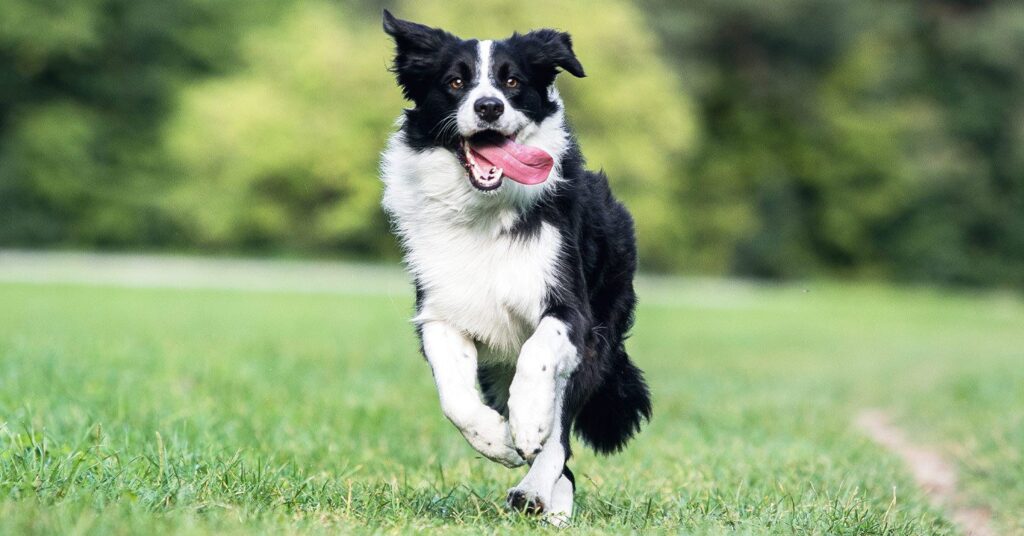
Answer to a mystery
Though the science of DNA testing is still developing, it has come a long way in recent years. Countless online reviewers on Amazon, in various product reviews online, and even on the DoggyDNA Reddit community attest to their pet’s breed results.
For most pet parents, a dog DNA test is a positive experience. Learning more about your dog only helps to strengthen your bond. This sweet video from BuzzFeed shows rescue dog owners learning their dog’s DNA test results, and, well, just try not to cry.
My own dogs’ breed breakdowns surprised me. I used Embark for my pups based on their great reviews. Embark packages up your results in a colorful email that links to a personalized profile for your pet.
Scout was just a puppy when she traveled all the way from Korea to Seattle thanks to rescue and foster organization Saving Great Animals. She’d been found tied up with a fishing line that had grown into her neck. After two surgeries, you can no longer see any sign of her injury. She’s a medium-sized dog with a curly tail and territorial instincts.
Based on these instincts, we assumed she was some kind of collie or cattle dog mix. The rescue had mentioned that she was likely part Jindo, too, which is the national dog of Korea.
Guess what? Scout isn’t a collie, a shepherd, a heeler, or any other kind of herding dog. Jindo didn’t show up in Scout’s DNA results, either—but she did get 100% East Asian Village Dog, and since Jindo isn’t a registered breed (rather, a “landrace” breed), she may have some Jindo genes.
As for Vera, our wire-haired cutie with oversized ears, we’d been told she was a Shih-Tzu-Heeler mix. Friends guessed Jack Russell and Papillon.
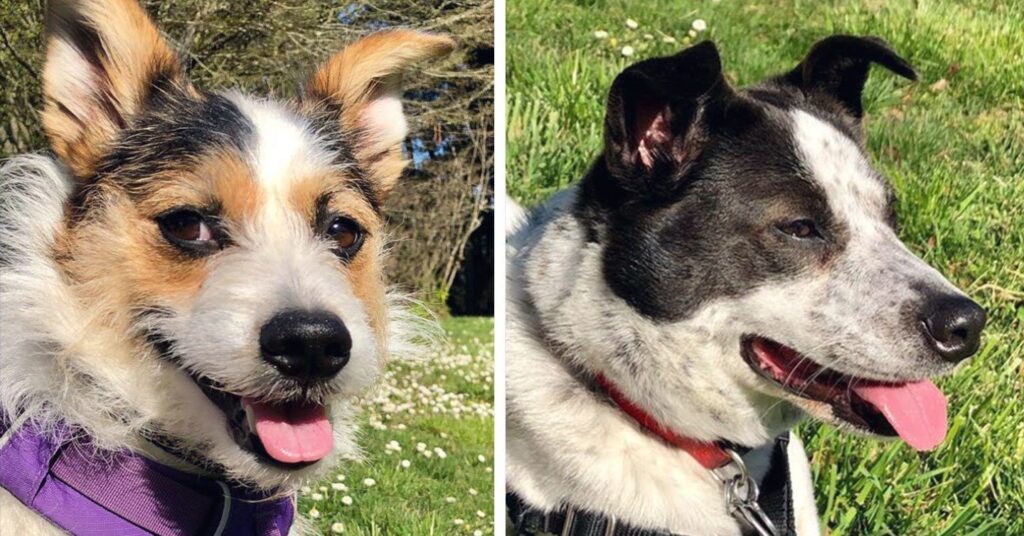
In the end, we found out that Vera is a true mutt: mini-Schnauzer and cattle dog dominate her results, but she’s got many other breeds in there, including 9% German shepherd. In fact, she was designated part “Supermutt,” which Embark coined to describe dogs descended from many other mixed breed dogs.
At least now I can tell curious strangers about my pets’ breeds. That is, if they want to stop and listen to the complicated origin stories.
If not, I can always just say “they’re mutts,” with all the love in the world.
